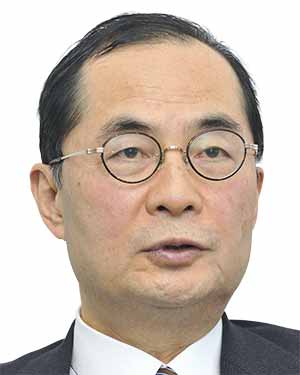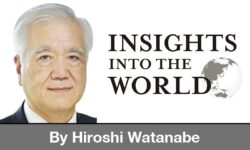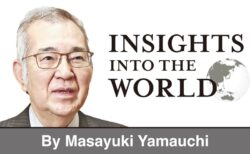11:05 JST, November 4, 2022
We are living in a time of uncertainty. There is no shortage of factors fueling this anxiety, including the novel coronavirus pandemic, which will mark its third anniversary soon; the war in Ukraine, which has reached a point where the specter of nuclear warfare is being discussed; the extreme weather; the widening of inequality; the population decline in Japan and the sharp price increases.
Kristalina Georgieva, managing director of the International Monetary Fund, said in a speech on Oct. 6: “We estimate that countries accounting for about one-third of the world economy will experience at least two consecutive quarters of contraction [which constitutes an indication of a recession] this or next year.”
The U.S. economy is normally expected to lead the global economy but it is extremely unstable at this time. Inflation rose 8.2% in the United States in September. To contain inflation, the Federal Reserve Board has raised interest rates multiple times since March. How far and how fast will the U.S. central bank ultimately increase them? Stock prices continue to fluctuate skittishly on the New York Stock Exchange, with investors speculating how the Fed’s monetary policy and U.S. consumer prices will evolve in the near term.
When economic statistics indicating a pause in inflation are released, stock prices rally as market participants become inclined to believe that interest rate hikes will halt at a reasonable level. Conversely, stock prices fall when market participants foresee a prolonged spike in inflation and a majority believe that sharp interest rate increases are likely to continue. When U.S. interest rates become increasingly likely to rise, the yen weakens further on the foreign exchange markets, a situation even currency market interventions by the Japanese government cannot reverse.
On Oct. 4, the Dow Jones Industrial Average jumped 825 points, going back above the milestone level of 30,000 for the first time in about two weeks. The rally was driven by lower-than-expected U.S. job openings data for August that helped ease market worries about the possibility of the Fed pushing ahead with large interest rate hikes. However, just three days later, on Oct. 7, the Dow closed 630 points lower than the previous day as a solid jobs report for September was released, making the market increasingly cautious that the Fed would stick to a tight monetary policy.
As paradoxical as it may seem, U.S. stock prices currently slump every time data indicates that the nation’s economy is in good shape. The fact that sharp spurts have been following slumps, and vice versa, in the equities market in recent months suggests uncertainty about the direction of the U.S. economy.
‘Inconvenient truths’
To make matters worse, a number of long-term structural problems are looming over the world, in addition to near-term market-related problems such as wild day-to-day fluctuations in stock prices.
For example, the United States saw its average life expectancy at birth drop by 2.7 years over just the last two years. It experienced a decrease of almost 1 year from 77 years in 2020 to 76.1 years in 2021, along with a 1.8-year contraction in 2020. This two-year decline in U.S. life expectancy was the biggest in the past century, or since the 1921-23 period.
Life expectancy in Japan, too, became shorter in 2021 due to the impact of the COVID-19 pandemic, but its year-on-year decline was only 0.1 years. The sharp drop in U.S. life expectancy is one of the “inconvenient truths” that epitomize the ongoing worries of the United States, a nation that is described by itself and others as the leader of the liberal world.
Since the beginning of the 21st century, empirical research shows that economic growth of democracies has tended to be slower than that of authoritarian regimes. In contrast, some economists say that in the 20th century, the more democratic a country was, the better its economy performed. They believe that trend has reversed since the 21st century began.
What the world witnessed in the early 20th century — the 1920s and 1930s, to be exact — was democracies such as the United Kingdom and the United States in agony, suffering from deep recessions, while authoritarian Nazi Germany ruled by Adolf Hitler and the then Soviet Union led by Joseph Stalin registered the strongest economic performance in the world. As the world struggled to get through this period of turmoil about 100 years ago, the catastrophic conflict of World War II broke out. Once peace was restored, democratic countries in the West kept growing in the latter half of the 20th century. This favorable era came to an end when the world ushered in the 21st century.
Innovation on decline
Japan is gripped by a much worse sense of stagnation. There have been astonishing changes in its nominal gross domestic product per capita, a comprehensive yardstick of the economic strength of each country. Global GDP data for 2000 put Japan at No. 2 in the world — just behind Luxembourg and ahead of the United States (No. 5), Germany (No. 19) and France (No. 21). However, according to GDP per capita estimates for 2022, Japan’s ranking has plummeted to 28th. Japan is still ahead of South Korea, which ranked 32nd, but it is now behind that nation in terms of average annual wages.
GDP is not necessarily an indicator of people’s happiness. Nonetheless, it is true that a country’s economic strength as measured by GDP is the foundation of its population’s lives. Without sufficient economic strength, not only medical care and education but human activity as a whole deteriorates. When an economy weakens, every aspect of people’s lives is affected.
The decline in Japan’s population continues unabated. It stood at 123.22 million as of Jan. 1, 2022, down about 620,000 from a year earlier — the 13th straight year-on-year drop and the fastest fall since the current survey started in 1968. The main reason was that the annual number of births shrank to about 810,000, hitting a new low for the sixth successive year. The record drop in births reflected the acceleration of the decline in the number of children with the impact of the COVID-19 pandemic.
Population decline is mainly to blame for the sense of stagnation in Japanese society. That said, it is premature to conclude that it is inevitable for the Japanese economy to stop growing due to the shrinking population.
It should be stressed that the global GDP rankings cited above refer to GDP per capita. Whereas a country’s overall GDP depends on its population, its GDP per capita level — a more precise indication of its society’s well-being — depends on innovation. Japan’s capability for innovation is on the decline.
Makeshift measures meaningless
What should we do during a period of turmoil? A long-term perspective is vital to seek solutions to a host of enormous challenges, such as the decline in economic strength, population decline and global warming.
To that end, we need political leaders in the truest sense of the word. It is regrettable that populism has been gaining ground across the world, a situation that makes it impossible to get through crises.
Britain’s then Prime Minister Liz Truss announced a package of budget measures on Sept. 23, soon after the state funeral for Queen Elizabeth II. Its key elements consisted of steps to subsidize electricity and gas bills for businesses and consumers and large tax cuts to revitalize the British economy. These so-called Trussnomics featured unfunded fiscal spending totaling £105 billion (about $121 billion), prompting markets to immediately criticize the prime minister for engaging in pork barrel politics.
As a result, Britain’s long-term interest rates jumped to 4.5% from the 2.8% recorded only three weeks earlier that same month. This was close to the yield of government bonds of Italy, whose fiscal uncertainty remains a problem. The British pound faced selling pressure and fell to a record low of nearly unprecedented parity with the U.S. dollar.
Truss then scrapped almost all tax cut measures and was forced to announce her resignation after just 50 days in office. In a period of turmoil, makeshift measures are meaningless. Japan should take what just happened to Britain as a warning from abroad.
The Japanese government is set to submit a draft second supplementary budget for fiscal 2022 to the Diet in November. The vital factor in getting through this period of turmoil is the extent to which political leaders can implement essential policies with a long-term perspective on what they must achieve. People-pleasing rhetoric will do no good at all.

Hiroshi Yoshikawa
Hiroshi Yoshikawa is a professor emeritus at the University of Tokyo. He was president of Rissho University from 2019 to March this year, and has also served as the chair of the Fiscal System Council, an advisory panel to the finance minister.
Top Articles in Editorial & Columns
-

Riku-Ryu Pair Wins Gold Medal: Their Strong Bond Leads to Major Comeback Victory
-

40 Million Foreign Visitors to Japan: Urgent Measures Should Be Implemented to Tackle Overtourism
-

China Provoked Takaichi into Risky Move of Dissolving House of Representatives, But It’s a Gamble She Just Might Win
-

University of Tokyo Professor Arrested: Serious Lack of Ethical Sense, Failure of Institutional Governance
-

Policy Measures on Foreign Nationals: How Should Stricter Regulations and Coexistence Be Balanced?
JN ACCESS RANKING
-

Japan PM Takaichi’s Cabinet Resigns en Masse
-

Japan Institute to Use Domestic Commercial Optical Lattice Clock to Set Japan Standard Time
-

Israeli Ambassador to Japan Speaks about Japan’s Role in the Reconstruction of Gaza
-

Man Infected with Measles Reportedly Dined at Restaurant in Tokyo Station
-

Videos Plagiarized, Reposted with False Subtitles Claiming ‘Ryukyu Belongs to China’; Anti-China False Information Also Posted in Japan























